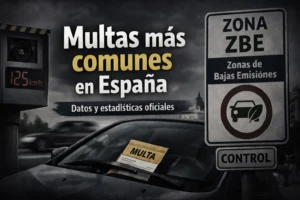
Is it legal to record with a car dashcam in Spain? Everything you need to know for 2025
Dashcams, or car cameras, are increasingly popular for their usefulness in recording accidents, vandalism, or curious moments on the road. However, their use in Spain is regulated by various laws, and it's important to understand them to avoid fines or legal problems. In this guide, we explain everything you need to know about their legality, including the penalties you can receive if you don't use them correctly.
Is it legal to use a dashcam while driving?
Yes, you can use a dashcam in Spain, but there are certain conditions you must meet for it to be legal:
1. Proper installation:
- The dashcam should not obstruct your field of vision. The best place to install it is behind the rearview mirror.
- According to the Directorate General of Traffic (DGT), any object that obstructs the driver's vision can be grounds for a fine. If the dashcam is incorrectly positioned, you could receive a €200 fine.
2. Do not manipulate it while driving:
- Interacting with the dashcam while the vehicle is moving, as with any other electronic device, is prohibited. This could be considered a distraction and result in a €200 fine and the loss of three points on your driver's license.
What does the law say about privacy?
Dashcam recording is subject to data protection regulations in Spain, primarily the General Data Protection Regulation (GDPR) and the Organic Law on Data Protection (LOPDGDD). These laws regulate how recordings can be used to ensure personal privacy.
What is allowed?
Record for personal use: You can use the images to protect yourself in case of an accident or damage to your vehicle.
Using recordings as evidence: Images may be admissible in legal proceedings, provided they were obtained lawfully and do not violate the privacy rights of others.
What is prohibited?
Sharing recordings without consent: Uploading videos to social media or public platforms (YouTube, Instagram) that include license plates, faces, or identifiable information of third parties without their explicit consent is a serious offense. This can lead to fines of up to €10,000, according to the Spanish Data Protection Agency (AEPD).
Continuous surveillance of public spaces: Indiscriminate or continuous recording in public spaces, without justified reason, can be considered illegal and carry significant penalties.
Can you record with a dashcam while the car is parked?
Recording while the car is parked is legal in some cases, but is subject to strict limitations due to video surveillance regulations.
1. Recordings in public spaces:
- If your dashcam records continuously while your car is parked on a public road, you could be violating the privacy of others (pedestrians or nearby vehicles). This is considered a violation of data protection laws and could lead to fines of €6,000 to €20,000, depending on the severity.
2. Using motion detection mode:
- If the camera has a recording mode that only activates when motion is detected (for example, if someone approaches your car), it's more likely to be considered legal. Still, the footage should be used for personal purposes only.
3. Recording on private property:
- If the car is parked on private property (your garage or private parking lot), you have more freedom to record, as long as the images don't capture public areas.
Fines related to the use of dashcams
If you don't comply with the regulations, you could face these penalties:
- Incorrect installation: If the dashcam obstructs your field of vision, the fine will be 200 euros.
- Manipulating the dashcam while driving: This is punishable by 200 euros and 3 points on your driver's license.
- Posting third-party images without consent: May result in fines of up to 10,000 euros.
- Improper video surveillance in public spaces: Continuously recording while the car is parked can lead to fines of 6,000 to 20,000 euros, depending on the violation.
Tips for using your dashcam legally
1. Install it correctly:
- Make sure it doesn't interfere with the driver's vision. Consult your dashcam's manual and the DGT recommendations.
2. Use recordings only for personal purposes:
- Do not share images on social media or with third parties without the consent of the people involved.
3. Activate legal functions in parking mode:
- If your dashcam has motion detection, be sure to set it to record only when it detects nearby activity, avoiding unnecessary recordings.
4. Check local regulations:
- Some autonomous communities or municipalities may have specific regulations regarding the use of cameras in vehicles.
Conclusion:
Using a dashcam in Spain is legal, as long as road safety and data protection regulations are followed. Although it can be a very useful tool to protect yourself in the event of an accident or incident, it's important to be careful with the images captured and how they are used to avoid fines.
Remember that recordings are for personal use and should never violate the privacy of others. By using your dashcam responsibly, you can enjoy its benefits without legal issues.
Before making a decision, consider factors such as your budget, the features you really need (such as night vision, real-time connectivity, or 4K recording), and the type of driving you do. With any of the options presented here, you'll be investing in safety, peace of mind, and the ability to document every mile of your journey.
If you have additional questions or need help choosing the best dash cam for your car, leave us a comment! We'd be happy to help you make the best decision.
We also recommend you read our post about The 5 Best Dashcams of 2025 to ensure you make the right purchase.
In car gadgeting We also write articles about all sorts of things related to cars and their gadgets, such as statistics like How many drivers use dashcams? either Legal information about dashcams according to the DGT (Spanish Directorate General of Traffic).
Share:
Table of contents
More entries
Send a message





3 Responses